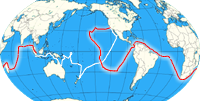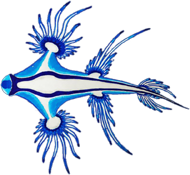If you want to see the threatened African Penguins (Spheniscus demersus) there is no better place in South Africa than Simon's Town. Since they also have a marina we were definitely stopping there. The marina is in the middle of the town and it is only about 2 km to the areas where the penguins live. We went there by foot and when we found the first beach we wanted to pass by and go directly to the national park area. But then we saw a small group of penguins sitting on one of the stones enjoying the sun. We observed them for a while and watched them waddle around on land but mutate to a torpedo after jumping into the water.
Then we decided to move on to Foxy Beach where the beach is fenced to protect the penguins. For a small entrance fee you can walk on boardwalks very close to the main colony. There are also signs with information on the area and the penguins and we also discovered a penguin which was protecting his egg. The breeding season starts only in February but some of them apparently are early birds. Most of them are still mating and sit in twos on the beach or under the bushes, which were replanted in this area. Sometimes they already sit in front of a nest which can be a shallow scrape, burrows in sand or even an artificial structure like the nest baskets set up for them. Those penguins are monogamous and stay together their whole life. And you often see them cuddling or touching each other tenderly.
From just two breeding pairs in 1986, the penguin colony has grown to almost 3.000 in recent years. This is partly due to the reduction in commercial trawling in False Bay, which has increased the supply of small fish which their main food source.
Even better to get in touch with the penguins is Boulders Beach where you can go swimming with and lie on the beach between them. But you have to be careful often that they do not bite or lunge at you since you have to pass quite closely. Their sharp beaks could cause serious injuries. Once in a while you see one penguin looking different because the feathers stand out and are not in shape. This means that he is moulting, the old feathers are replaced and during this time, for about 21 days, the birds loose their waterproofing and are confined to land. It is a time of starvation for them. One time we observed a pair balancing a fresh egg on some rocks. We just thought about how they will manage to keep it on the rock and at that moment it happened. One of them pushed the egg and it fell onto the sand. Within one second a seagull moved down and took the egg. The poor penguin pair looked miserable and searched for the egg for a while.
Other marine animals you can observe in big groups on the open ocean and especially in the bay in front of Cape Town are the South African or Cape Fur Seals (Arctocephalus pusillus pusillus). Time and again there are small groups floating on the surface and sticking their extremities in the air. That is when they rest or even sleep and once in a while they will get startled and dive because we are sailing by. At our anchorage in Simon's Town we even had our own Fur Seal which loved to chill under our boat. Fur Seals are the main food for the Great White Sharks (Carcharodon carcharias) which breed in this area. At the moment it is not main season but still some sailors could observe them around their boats and one was even spotted inside the Simon's Town Marina.
Shortly before going out onto the Atlantic we made a short stop at Robben Island and were surprised by a whale coming up for air in front of the boat. Apparently there is a group of young humpback whales (Megaptera novaeangliae) which seem to stay and find food here all year. They swam around our boat at the anchorage and opened their mouths to eat as many small shrimp as possible. One of them even came so close that he almost swallowed our anchor chain. So we were able to see the baleen inside the mouth for the first time. An amazing sight which we will never forget.
And finally when we started our journey towards Ascension we saw some Albatross (Diomedeidae) flying their circles next to our boat and some Common Dolphins (Delphinus delphis) - for us definitely not common. What a nice goodbye from Africa.




_were_called_Jackass_Penguins_before_because_of_their_donkey-like_braying.jpg)



















 >>planned route - join us ...
>>planned route - join us ...